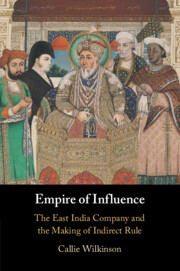Book contents
- Empire of Influence
- Empire of Influence
- Copyright page
- Dedication
- Contents
- Figures
- Maps
- Acknowledgements
- Note on Translation and Transliteration
- Chronology
- Abbreviations
- Additional material
- Introduction
- 1 A Time of Trouble
- 2 Negotiating the Disinformation Order
- 3 Warfare and ‘Wanton Provocations’
- 4 The Price of Pageantry
- 5 Weak Ties in a Tangled Web
- 6 Kinship, Gender, and Dynastic Dramas
- Conclusion
- Glossary
- Bibliography
- Index
1 - A Time of Trouble
Published online by Cambridge University Press: 23 March 2023
- Empire of Influence
- Empire of Influence
- Copyright page
- Dedication
- Contents
- Figures
- Maps
- Acknowledgements
- Note on Translation and Transliteration
- Chronology
- Abbreviations
- Additional material
- Introduction
- 1 A Time of Trouble
- 2 Negotiating the Disinformation Order
- 3 Warfare and ‘Wanton Provocations’
- 4 The Price of Pageantry
- 5 Weak Ties in a Tangled Web
- 6 Kinship, Gender, and Dynastic Dramas
- Conclusion
- Glossary
- Bibliography
- Index
Summary
Between 1798 and 1818, a theory and practice of paramountcy was forged, with lasting consequences for the Company’s empire in India. Though the subsidiary alliance system first emerged in the mid-eighteenth century, and the first Residents were posted to Indian courts in the 1770s, British conceptions of their own role in the subcontinent were initially limited to maintaining the status quo. Governor General Richard Wellesley, however, replaced the older emphasis on the balance of powers with a new, more moralizing vision of tranquillity in the subcontinent, with the Company acting as the ultimate political and military arbiter. Though Wellesley’s ambitions were repudiated initially, his insidious legacy lived on through the Residents who matured under his influence. By 1818, the Company’s right to intervene in allied kingdoms had moved beyond the realm of debate, even if the appropriate degree of intervention was never conclusively settled. Precedents from 1798 to 1818 would be cited as late as 1929 to justify the British government’s sweeping powers relative to its Indian allies. While 1857 is usually presented as a point of rupture in the history of the princely states, the period 1798–1818 set the terms for debates that rumbled on until Indian independence.
Keywords
- Type
- Chapter
- Information
- Empire of InfluenceThe East India Company and the Making of Indirect Rule, pp. 33 - 62Publisher: Cambridge University PressPrint publication year: 2023

